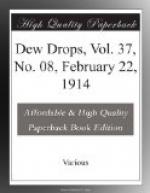Mother looked a little surprised. “Are you quite sure you can spare them, dear? You do not have oranges very often.”
“I’d like to,” Leslie insisted earnestly. “I don’t believe Red Riding-Hood was selfish, and I’m sure White Riding-Hood doesn’t want to be.”
So mother put in three big yellow oranges, and Leslie ran down the hill with her basket. Granny Graham was a tiny, sweet old lady who lived in a tiny cottage at the foot of the hill.
Leslie knocked at the door and a pleasant voice called, “Come in.” Leslie opened the door and stood inside in her pretty furry things, feeling quite nice and shivery over even playing that Granny was a wolf.
“Good-morning, Granny,” she said, “I’m Little White Riding-Hood.”
“Good-morning, my dear,” said Granny, smiling, “how nice you look.”
“Oh, Granny,” cried Leslie, “‘what bright eyes you’ve got!’”
Granny’s bright eyes twinkled with fun as she answered, “’The better to see you with’.”
Leslie giggled; that was just the way it went in the story. “’Oh. Granny,’” she went on playing, “‘what long ears you have!’”
“‘The better to hear you with,’” answered Granny; which was all very funny because the ears peeping out from under Granny’s cap were tiny like the rest of her, and did not hear any too well at best.
After that, Leslie held her basket a bit tighter and said, “’Oh, Granny, what sharp teeth you’ve got!’”
“‘The better to eat you with,’” laughed Granny, “I’m sure you look quite sweet enough.”
Leslie ran over and put the basket in her lap. “The oranges are sweeter,” she said, “please eat those instead.”
“All right,” Granny agreed, “if you will give me a kiss with them, that will be next best to eating you.”
In her heart, Leslie thought it was much better, and while Granny Graham ate one of the oranges they both decided that the story of Little White Riding-Hood had a much pleasanter ending than the old one in Leslie’s book.
—Written for Dew Drops by Marion Mallette Thornton.
+---------------+ | | | Knowledge Box | | | +---------------+
Musical Hespie and Her Play.
Little Hespie, the wood mouse, sang sometimes as long as nine minutes. Her song usually came forth when she was at play, or exercising in some way. One time she became especially delighted because her wheel squeaked when she turned it. You know how pleased a boy is when his hobbyhorse creaks. So Hespie, too, enjoyed the new noise; but it so drowned her pretty little warble that a drop of oil was put in the wheel to stop the creaky sound.
Poor Hespie became quite excited over this change, and bit the wires of her wheel. So a plan was made to soothe poor mousie’s feelings. A small strip of stiff paper was placed in such a way that it hit the wheel every time it turned and so made a nice little noise. Hespie forgot her trouble and worked at the wheel joyously, making the paper noise and singing her pretty song at the same time.




